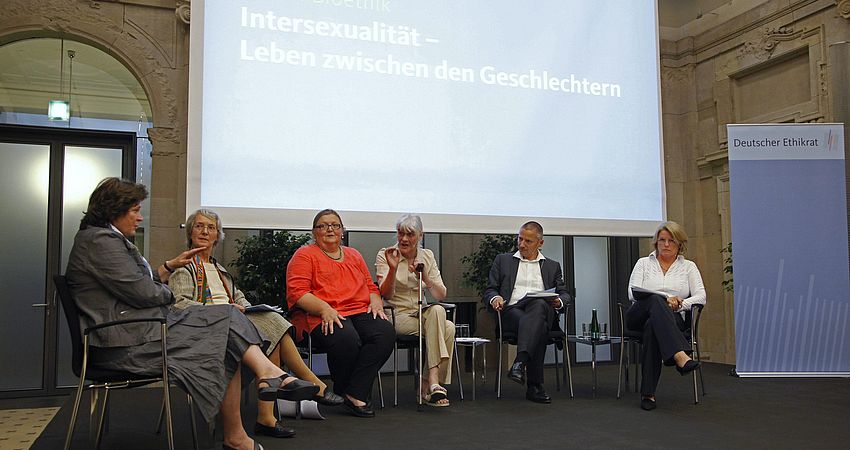Bioethics Forum
Intersexuality – Life Between the Sexes

Podiumsdiskussion: Prof. Dr. phil. Hertha Richter-Appelt, Prof. Dr. iur. Konstanze Plett, LL. M. (Wisconsin-Madison), Lucie Veith, Verein Intersexuelle Menschen e. V., Claudia Kreuzer, Verein Intersexuelle Menschen e. V., Dr. phil. Michael Wunder und Prof. Dr. med. Claudia Wiesemann (v. l.), Deutscher Ethikrat, Fotograf: Reiner Zensen
Topic
Intersexuality refers to many different phenomena of ambiguous gender affiliation, each with different causes. Information on how many people are affected varies greatly depending on how intersexuality is defined.
In all areas of life in which a classification according to gender is made, intersexual people are forced to make a decision that they actually cannot and do not want to make and therefore often perceive as discriminatory. They often also feel disadvantaged by the current legal situation, especially the law on civil status, the law on names and the law on marriage and partnership.
Three legislative proposals are currently being discussed in the German Bundestag with the aim of including the characteristic of sexual identity in the prohibition of discrimination laid down in the Basic Law (Article 3 (3) sentence 1). The proposals are meant to improve the legal status of intersexual persons and their protection against discrimination.
Against this background, the question arises whether individual forms of intersexuality are a disorder or rather a variant of gender development. Based on this, a number of medical, legal and socio-ethical questions arise:
- How do corrective or compensatory interventions in childhood with lifelong consequences relate to the right to physical and psychological integrity and self-determination?
- What are potential arguments against a diversity of bodies, gender identities and social roles?
- What is the responsibility of society in dealing with otherness? What is the role of politics?
- What are the experiences and needs of those affected and what conclusions can be drawn from their specific knowledge?
The Ethics Council aims to challenge the taboo surrounding the topic, to question prevailing, socially determined gender norms and thus to initiate a discussion on the social acceptance of intersexual people. As part of its “Bioethics Forum” series, the Ethics Council discusses the above-mentioned questions together with Prof. Dr. Hertha Richter-Appelt, Prof. Dr. Konstanze Plett, Prof. Dr. med. Claudia Wiesemann as well as with Lucie Veith and Claudia Kreuzer. Dr. Michael Wunder will lead through the event.
